- IoT startup funding achieved a 15% year-over-year increase from Q1, 2019 to Q1, 2020, reaching $4.7B for the latest calendar quarter according to Venture Scanner's IoT Q1 Funding Update.
- Consumer connected cars and networkable printing and photocopying are the two IoT use cases that predicted to produce $72B and $38B, respectively, in 2020 according to Gartner's latest forecast.
- The worldwide commercial IoT market is forecast to grow from $385B in 2019 to $687B in 2025, attaining a CAGR of 10.1% according to Technology Business Research's latest forecast.
IoT startups see opportunity in the inefficient, time-consuming approaches complex industries rely on to get work done. There are over 34,000 IoT startups in Crunchbase alone, competing across enterprise and automotive IoT, commercial, automotive, manufacturing, retail & wholesale trade, and transportation industries.
COVID-19's hard economic reset has hit the industries IoT startups rely on particularly hard. Automotive, retail & wholesale trade, and transportation are among the hardest hit. IoT revenue projections for the transportation industry this year dropped from $43B in value to $34B according to Gartner's latest estimates. Enterprise and Automotive IoT dropped from $393B to $351B in market value in the first few months of this year. Healthcare provider IoT revenue forecasts are among the most optimistic, predicted to increase from $25B to $29B this year.
The Top 20 IoT Startups To Watch In 2020
Based on a methodology that equally weighs a startup's ability to attract new customers, current and projected revenue growth, ability to adapt their solutions to growing industries and position in their chosen markets, the following are the top 20 startups to watch in 2020:
1. Armis Security – Armis' mission is to enable enterprises to adopt new connected devices without fear of compromise by cyber-attack. What makes Armis unique and worth watching is the quickness that they turn concepts into products and successful track record innovating their platform. Armis is an enterprise-grade security platform that discovers devices on and off the network, continuously analyzes endpoint behavior to identify risks and attacks, and protects critical information and systems by identifying suspicious or malicious devices and quarantining them. Their Risk Engine can analyze device behavior to identify threats or attacks and protect essential business information and systems. They're known for in-depth expertise in the asset inventory, risk management, detection & response, and assisting customers in creating Zero Trust frameworks to protect all devices relied on. Founded in 2015, the company has active customers in finance, healthcare, manufacturing, and high technology industries. The following is a graphic of the Armis deployment architecture:
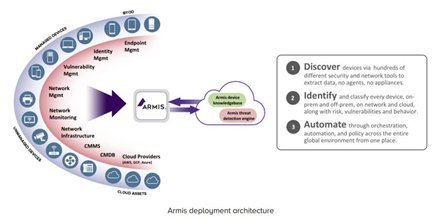
2. Bastille– Founded in 2014, Bastille is the leader in enterprise threat detection through software-defined radio. Bastille provides full visibility into the known and unknown mobile, wireless, and Internet of Things (IoT) devices inside an enterprise's corporate airspace – together known as the Internet of Radios. Through its patented software-defined radio and machine learning technology, Bastille senses identify and localize threats, providing security teams the ability to accurately quantify risk and mitigate airborne threats that could pose a danger to network infrastructure. Bastille now has 17 U.S. Patents issued and more pending. Bastille's software-defined sensor arrays scan from 60 MHz to 6 GHz. Within that range, Bastille has more than a dozen protocol decoders, including Cellular, Wifi, Bluetooth, Bluetooth Low Energy (BLE), ZigBee, DECT, and others. Using software-defined radios, we see all the emitters distinctly, and then by using protocol decoders in the arrays, we digitally demodulate the protocols. Bastille's technological expertise is impressively evidenced by their announcing the commercial availability of the only solution that can accurately locate cell phones indoors using only cellular signals as shown in the graphic below:
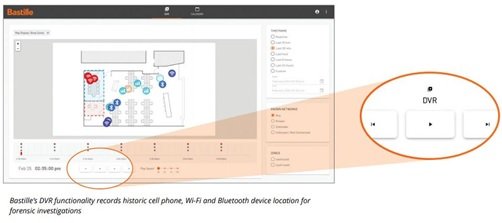
3. Blues Wireless - Blues Wireless aims to put people and businesses better in touch with their world by unlocking the potential of cellular IoT. Its product, The Notecard, currently in beta, is a simple, cost-effective embeddable, mobile IoT solution for cloud-based monitoring and connected operations. Last year Blues Wireless announced they are collaborating with AT&T on a series of services based on low-power cellular connections. It was founded in 2018 by Ray Ozzie and is headquartered in Seattle, Washington.
4. Cartesiam – Founded in 2016, Cartesiam is a software publisher whose mission is to develop artificial intelligence solutions on ubiquitous, low-cost, low-power microcontrollers. Cartesiam's patented AI development platform, NanoEdge AI, enables cognitive functions (machine learning) on microcontrollers embedded in connected objects. One of Cartesiam's greatest strengths is its ability to excel at projects that require integrating microcontrollers across a broad spectrum of industries. Previous customer engagement and projects are known for their simplicity of deployment, secure environments created, rich, contextual analysis, and reduced power consumption. Co-founded by Marc Dupaquier, François de Rochebouët, Michel, and Joël Rubino, Cartesiam's R&D and corporate headquarters are located in Toulon, France, with business operations based in Paris and New York.
5. CENTRI – What makes CENTRI unique is how they've created and continue to fine-tune their software-only platform that enables thing makers and developers to quickly get to market with purpose-built IoT security to protect their data from chip-to-Cloud. CENTRI eliminates the risk of data theft and delivers device integrity by integrating a wide spectrum of standards-based technologies to accelerate customers' time-to-market. They're equally adept at layered security for endpoints and edge data for gateways. Customer case studies highlight CENTRI's ability to secure data on endpoint devices, secure transmissions within communication channels, and secure delivery inside an application server. The following graphic illustrates how the CENTRI architecture works:
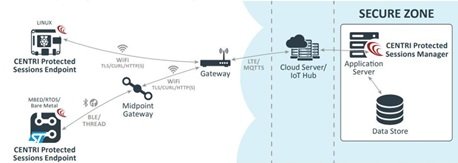
6. Eta Compute – Eta Compute's founders launched the startup to achieve the vision of helping companies develop products with significantly longer battery life or powered by energy harvesting. To achieve their vision, the founders' Eta Compute developed EtaCore™, the world's lowest power microcontroller IP, which delivers a 10X improvement in power efficiency over any alternative. Eta Compute develops and licenses the lowest power SoC IP for energy-constrained sensors and devices for the Internet of Things (IoT) on the market today. Eta Compute has been able to adapt quickly to the COVID-19 hard reset by offering a variety of licensing models designed to meet the unique needs of each industry they serve.
7. Finite State – Finite State is noteworthy for the level of IoT device intelligence they are capable of capturing, analyzing, and providing recommendations to customers with. The company's technology helps businesses identify their vulnerabilities, quantify their risks, and take preventative actions before hackers compromise their devices. Built on two decades of collective cyber-security experience serving the Fortune 50 and the U.S. Intelligence community, Finite State was founded in 2017 and is headquartered in Columbus, Ohio.
8. Helium – Helium is an Internet-of-Things developer platform for building the network and transferring IoT device data. The platform is built on a peer-to-peer wireless network that simplifies internet connectivity for IoT sensors and devices. What differentiates Helium is its ability to provide wireless coverage for low power Internet of Things (IoT) devices. The company is taking a unique approach to motivating customers to adopt their Helium HotSpot, which sells for $495. They're offering their cryptocurrency, Helium, in exchange for buying and using the device, which helps to create "LongFi" wireless networks that have 200X the range of wifi at 1/1,000th of the cost of a cellular modem. Key investors include Mark Benioff, SV Angel, FirstMark, Khosla Ventures, and GV (formerly Google Ventures). They've created an informative, humorous video that explains who Helium is and you can view it here.
9. Hologram - Hologram is a connectivity enablement toolkit that empowers makers, engineers, and creators of all types to connect their devices with wireless data as well as manage billings as they grow. Hologram provides a flexible platform with no minimums, simplified connectivity, and proven scalability to help its users grow their businesses and projects from 1 to 1000 devices. Its goal is to simplify the process of building connected hardware that works everywhere. Hologram was founded in 2013 and is based in Chicago, Illinois.
10. InfluxData – InfluxData created InfluxDB, their Open Source Platform specifically designed to analyze metrics and events (time-series data) for DevOps and IoT applications. Whether the data comes from humans, sensors, or machines, InfluxData enables developers to build monitoring, analytics, and IoT applications at scale, delivering measurable results fast.
11. Inspirit IoT - Inspirit IoT's mission is to provide hardware accelerator solutions coupled with advanced high-level synthesis and machine-learning optimization toolkit to enable smart IoT applications. What makes this startup noteworthy is their expertise with sensor intelligence analytics intended to accelerate the machine learning performance of IoT hardware. The company's analytics offers deep neural network analysis and optimization tools, chip-agnostic high-level synthesis, and hardware accelerator solutions through design tools and custom platforms, enabling clients to deliver a compelling channel and customer experience in markets for efficient hardware deployment.
12. Karamba Security – Karamba Security's patented software detects and prevents cyberattacks on a wide variety of connected devices and systems, including automotive ECUs, Industry 4.0 controllers, enterprise edge devices, and IoT endpoints. Karamba's security solutions are embedded within devices and work automatically, without any need for customer operation and with a negligible performance impact. The following video explains Karamba Security's approach to securing IoT devices at the firmware level.
13. Logmore - Logmore offers small, cost-efficient data loggers for an organizations' monitoring needs, supported with their cloud service. Logmore Web is its cloud-based platform for data collection and mobile application access and analysis. Data upload happens in less than a second through simple scans of QR codes, which are compatible with any smart device that has a camera.
14. Medigate – Medigate's mission is to protect every clinical network from cyberattacks. Medigate is noteworthy for the extensive expertise their dedicated medical device security and asset management platform has, the first of its kind in healthcare. Medigate has successfully fused expertise, knowledge, and understanding of medical workflow and device identity and protocols to protect them for the many cybersecurity threats that exist today. With Medigate, hospital networks can safely operate all medical devices on their network, enabling the deployment of existing and new devices to patients while ensuring privacy and safety. As cyberattacks of all kinds have soared during the pandemic, it's great seeing startups like Medigate stepping up their development and innovation efforts to protect those who protect all of us.
15. Particle - Particle is the only end-to-end IoT platform that combines software, hardware, and connectivity as an integrated solution that ensures their customers' IoT products are reliable, scalable, and secure. Companies ranging from traditional manufacturers to fast-growing startups are launching IoT products powered by Particle. Particle works with leading companies across a variety of industries, including customers like Jacuzzi, Continental Tires, Watsco, Shifted Energy, Anderson EV, and Opti. Particle is venture-backed and has offices in San Francisco, Shenzhen, Las Vegas, Minneapolis, and Boston. Particle boasts the largest developer community in the IoT industry, with nearly 200,000 developers and engineers in more than 170 countries building with Particle.
16. PFP Cybersecurity - PFP's platform uses behavior analysis to detect dangerous implant-based attacks in hardware, firmware, and configuration. PFP constantly monitors the power behavior of devices/IoT in data centers, critical infrastructure & more. Their architecture captures data on a secured cloud platform where PFP detects malicious actors. PFP provides dashboards that display continuous, real-time monitoring, and customizable alerts. Remediation is automated, further increasing the security perimeter of customers' diverse IoT networks, often geographically distributed across diverse regions globally. PFP provides continuous monitoring 24/7, which authenticates, detects, and remediates any breach attempt thwarting bad actors' activities to harm an organization.
17. PoLTE - Polte's Cloud Location Services platform is a patented alternative to traditional GPS technology, which leverages ubiquitous 4G & 5G cellular networks and cloud computing to enable highly accurate indoor and outdoor Location as a Service (LaaS) data. Polte Cloud Location over Cellular (C-LoC) technology delivers savings for supply chain, logistics, transportation, manufacturing, automotive, energy, government, healthcare, and sharing economy sectors where assets are in motion and widely dispersed.
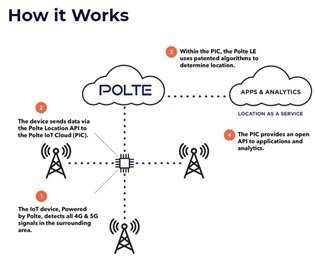
18. Securithings – SecuriThings is an IoT Security Platform, which easily integrates with IoT manufacturers and platforms to protect against illegal access to devices. SecuriThings mitigates attacks by seamlessly assessing IoT activities in real-time while providing manufacturers and service providers a holistic view of threats across identities and devices.
19. SPAN.IO - Span.IO develops products to enable the rapid adoption of renewable energy and deliver an intuitive interface for the home. They are a group of engineers with a passion for building products that can deliver a positive impact on the environment while enhancing the consumer experience. They believe that developing intelligent hardware and software that provides visibility and control at the edge-of-grid will be transformational to the energy sector. The company is backed by domain experts in energy, software, hardware, and consumer finance. They leverage their teams' collective experience in power generation, energy conversion, controls, and system integration to develop core products focused on enabling the rapid adoption of renewable energy. Span.IO is based in San Francisco in 2018.
20. SWIM.AI – Swim provides edge-based software that executes real-time analytics and machine learning for enterprises, equipment manufacturers, smart-cities, and IOT businesses. Its software locally processes and analyzes massive volumes of streaming data from devices/sensors/equipment where it is created, reducing network volumes, and generating real-time machine-learning business insights. Swim deploys its software at the edge to transform data into insights in real-time and delivers them to businesses, staff, operators, and customers. Its software is a "plug and play" solution for existing equipment and brownfield environments. Chris Sachs, Rao Arimilli, and Rusty Cumpston founded Swim in February 2015. Its headquarters is in San Jose in California.
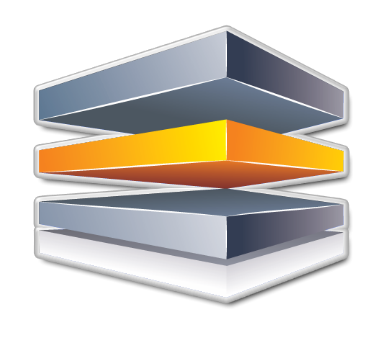 E-Library & File Box
E-Library & File Box